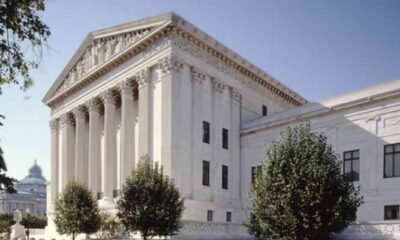arizona
Arizona Supreme Court Confirms Open Primaries Votes Will Be Counted

The Arizona Supreme Court has ruled that votes will be counted for the open primaries ballot initiative, known as Proposition 140, just 31 days before the upcoming election. This decision comes after a series of contentious court challenges surrounding the measure.
On Friday, the court upheld a previous ruling from September 19, confirming that supporters had gathered sufficient signatures to qualify the initiative for the ballot. The court also stated that even if the numbers were contested, it could not legally direct election officials to ignore votes cast on the proposition.
Proposition 140, dubbed the Make Arizona Elections Fair Act, aims to allow all registered voters to select from any candidate during the primaries, irrespective of party affiliation. The top candidates would then proceed to the general election, even if they belong to the same party.
The intent behind the initiative is to diminish extreme partisan influences in voting. However, opposition has emerged, specifically from the Arizona Free Enterprise Club, which has challenged the measure in court. Their contention rests on claims of excessive duplicate signatures, which they argue would disqualify the proposition from appearing on the ballot.
Initially, Maricopa County Superior Court Judge Frank Moskowitz declined to hear arguments regarding the disputed signatures. However, the Arizona Supreme Court intervened, instructing Moskowitz to reconsider the evidence just a day before ballots were set to be printed.
In its ruling, the high court also indicated that if enough signatures were invalid to exclude the measure, election officials should refrain from counting any votes related to it. This direction shifted after objections from the Make Elections Fair campaign and Secretary of State Adrian Fontes, who argued that disenfranchising voters would be unjust. The Supreme Court allowed for further arguments to be presented in the lower court.
Upon re-evaluation of nearly 40,000 challenged signatures, Judge Moskowitz found that most were indeed duplicates. Nevertheless, he concluded that valid signatures were sufficient for the measure’s qualification. He emphasized that the opponents needed to demonstrate that duplicate signatures had been counted twice to successfully invalidate the proposition.
Chuck Coughlin, the campaign consultant for Prop. 140, expressed relief at the court’s decision. “We’re thrilled,” he stated. “We’re finally free from the courts and have the ability to free Arizonans from partisan primaries and put elections back in the hands of the voters.”
Critics of Prop. 140 raise concerns about its provision for ranked choice voting in general elections, where voters could rank their preferences among multiple candidates. Despite these reservations, the measure leaves the implementation of such voting systems to the Arizona Legislature, which retains final authority over election formats.
Scot Mussi, president of the Arizona Free Enterprise Club, voiced disappointment following the court’s ruling. In a written statement, he claimed, “Our organization proved that the special interest groups attempting to hijack Arizona’s elections systems lacked the minimum number to qualify for the ballot.”
Mussi further alleged that the proponents were aware of the duplicate signatures and had actively obstructed the review process. The outcome of this legal battle now sets the stage for what could be a transformative election in Arizona.















